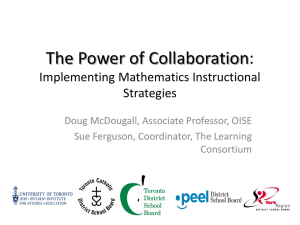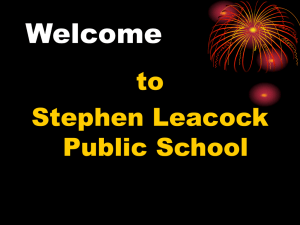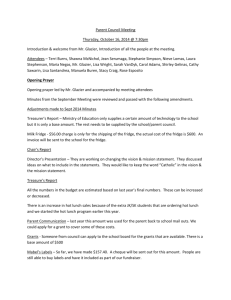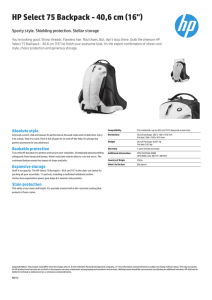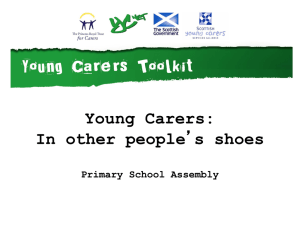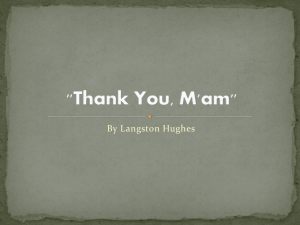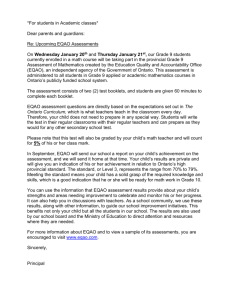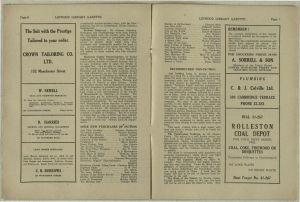File - Mrs. Chung`s Grade 3 Class
advertisement
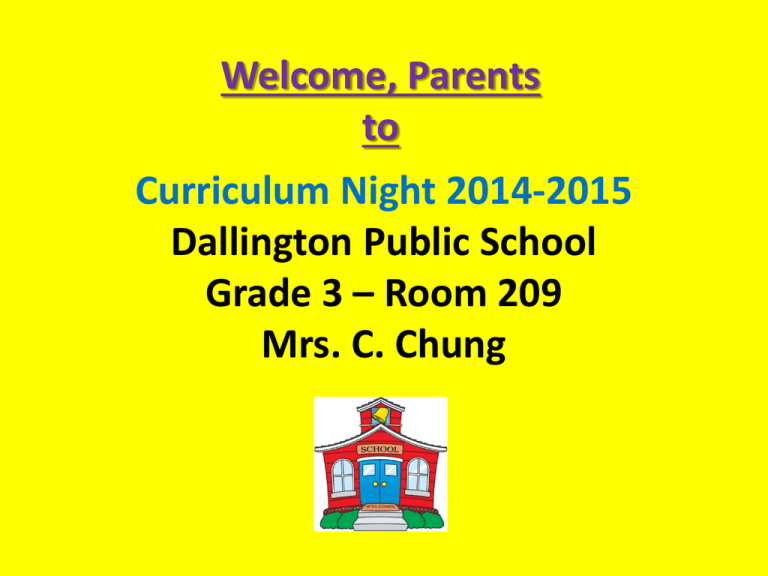
Welcome, Parents to Curriculum Night 2014-2015 Dallington Public School Grade 3 – Room 209 Mrs. C. Chung OVERVIEW 1. Classroom Conduct and Routines 2. Character Education 3. Arriving Prepared 4. Homework Policy 5. Reporting Timelines 6. Curriculum Areas 7. EQAO 8. Questions Classroom Conduct and Routines Dallington School Code of Conduct and Policies Our Social Contract No nut-related foods, no food for birthdays or special days – please focus on non-edible treats, such as stickers, pencils, erasers, etc. TDSB Character Education Traits September - Respect October - Responsibility November - Empathy December - Kindness & Caring January - Teamwork February - Fairness March - Honesty April - Co-operation May - Integrity June - Perseverance Arriving Prepared Indoor shoes – running shoes Punctual – sets tone for day, disruptions for other students, missed lesson Backpack with homework folder and homework, establish a routine to put everything in the backpack the night before Appropriate clothing, especially for recess Healthy snacks and water bottle Homework Policy Book Bag Program – 20 minutes every night – please discuss and ask questions about the text to check for comprehension (to begin within the next month) Finish up any work not completed in class or to reinforce in class lessons or extra practice work Visit our class website every night for information, and homework, including the School Newsletter www.room209.weebly.com Reporting Timelines 2 terms Elementary Progress Report in November Term 1 Report Card (February); Term 2 Report Card (June) Report Card Learning Skills – important to develop their work habits, study skills and organizational skills as the building blocks to school success (Responsibility, Organization, Independent Work, Collaboration, Initiative, Self-Regulation) Curriculum Areas Prescribed by the Ministry of Education and Training curriculum documents (available on www.edu.gov.on.ca) Curriculum Areas - Mathematics Five strands: 1)Number Sense and Numeration, 2) Algebra and Patterning, 3) Data Management and Probability, 4) Geometry and Spatial Sense, and 5) Measurement Four Categories of Knowledge and Skills: 1. Knowledge and Understanding – subject-specific content 2. and comprehension of its meaning and significance (importance) Thinking – use of critical and creative thinking skills (planning –UP, MAP, processing – COP, LOOK, creative/critical – inquiry, problem solving Communication –meaning through oral, written, and visual forms 3. 4. Application – use of knowledge and skills to make connections within and between various contexts. www.ixl.com Survey Results: 10 responses Helpful : 80% Would Like to Continue: 100% Purchase participation: 100% $10 per student --- Oct. 2014 to Oct. 2015 Language Four areas of focus: Oral Communication, Reading, Writing and Media Literacy – each addressed every term through a variety of lessons and activities Curriculum Areas - Reading: Read Alouds, Shared, Guided, Independent Poems, Fiction and Non-fiction Texts Writing – Forms addressed: Recount, Procedure, Narrative, Letter, Persuasive, Report, Poetry Independent Spelling Program Success Criteria • Setting a goal • Students take ownership for work • Generated and used by students Science and Technology Hands-On Science Resource, Science Kits, literature, integrated with Language, Scientists in the School Curriculum Areas - Grade 3: Forces Causing Movement; Strong and Stable Structures; Growth and Changes in Plants; Soils in the Environment Curriculum Areas - Social Studies Hands-On Social Studies Resource, literature, integrated with Language, Class trip the Pioneer Village Grade 3: First Nations; Early Settlers; Living and Working in Ontario The Arts Music, Drama, Dance and Visual Arts Music and Drama with Ms. Hong (Day 3, 4, and 5) Dance with Mr. Chiappetta (Day 2 and 5) Curriculum Area - Health and Physical Education Running shoes, comfortable clothing Day 2 and Day 5 with Mr. Chiappetta Curriculum Area - EQAO Grade 3 and Grade 6 province wide standardized tests for three subjects (reading, writing, mathematics) based on curriculum (end of May-beginning of June) Preparation for it began in Kindergarten – accumulation of all primary years Test taking skills begin now (e.g., complete answer / full sentences), do practice tests starting in April, keep it low key, do their best, does not reflect on Report Card marks Will be extra practice work sent home starting in April/May to help prepare students as well Eco Schools – Dallington is Platinum this year! • Litterless lunches • Sort waste: green bin, recycling, garbage • Lights out • Computer log off • Paper towels • Eco literacy: integrate environment awareness in all subjects • Community garden Questions? Thank you for coming this evening. Your continued support at home is appreciated and essential for your child’s current and future academic success.
